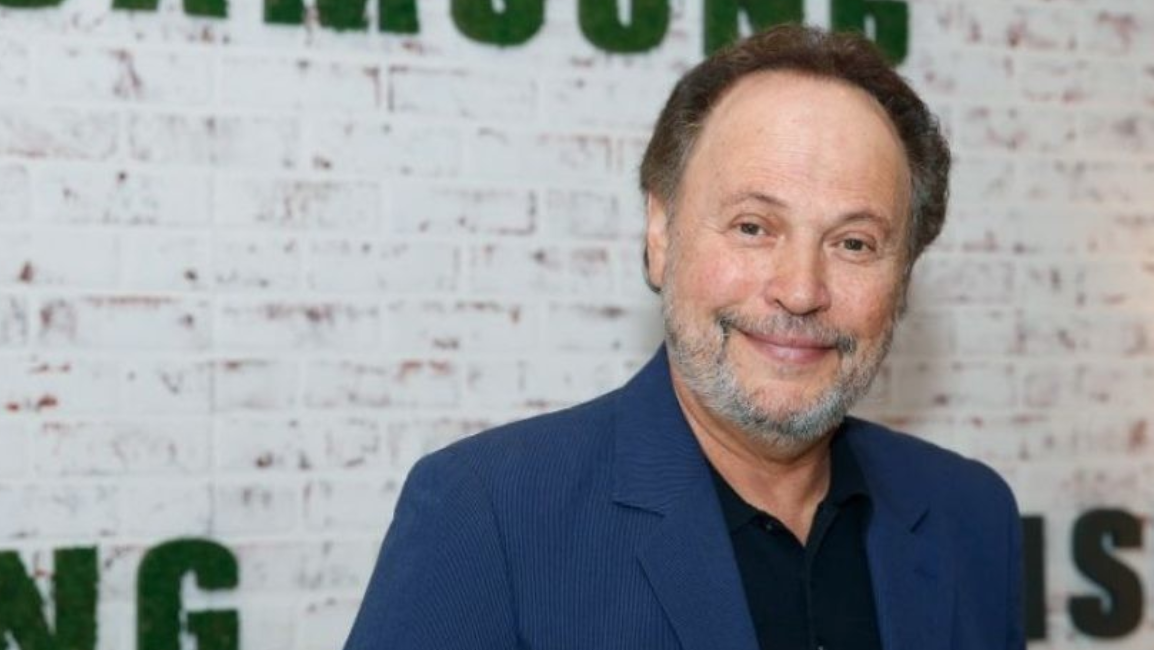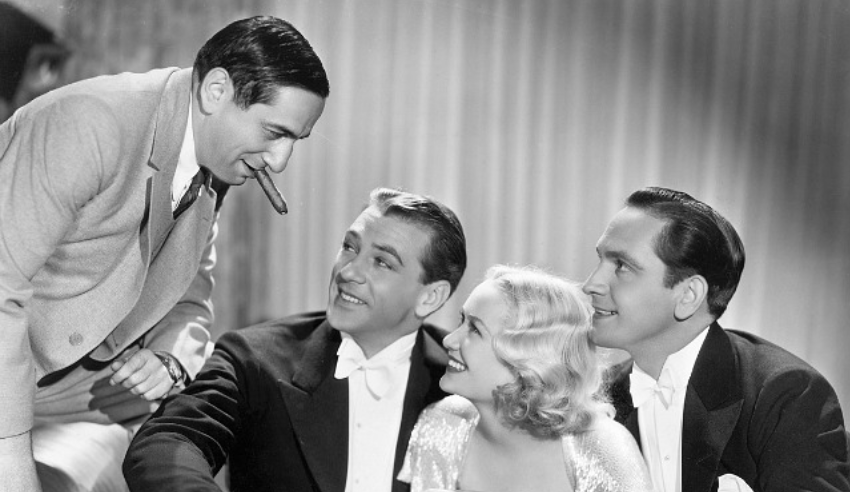Go on, tell me how much fun you had with Incredibles 2. How you just loved sitting with kids and their families. How you found it just as good if not better than the 2004 original. How impressed you were by the nonstop wit and action. How the post-Iron Man superhero onslaught had no influence upon the machine-gun, ADD-styled pacing. Go on, lay it on me.
Month: June 2018
Every Successful Magazine Has A Peak Period
Jacob Bernstein‘s “The Great Interview Magazine Caper“, a N.Y. Times “Style” piece (6.16.18), is a thoroughly reported, concisely written history of a high-fashion, celebrity-focused monthly that really seemed to matter from the early ’70s to early ’80s. To me anyway and others in my Manhattan journalist circle. Particularly, I would say, during the mid to late ’70s, and especially the Studio 54 heyday (’77 to ’80).
Launched by Andy Warhol in ’69, Interview folded last month after nearly 50 years in business.
I forget exactly when I realized that Interview had lost that special aura of downtown coolness, but it was probably sometime in the mid to late ’80s. It was clear to one and all that the edge factor was gone by the early ’90s. I’m amazed that a past-its-prime version of Interview limped along for a quarter-century, but it did.
My one and only visit to Interview‘s editorial offices was in early ’78. I had written up an interview with Sterling Hayden for Fairfield County magazine, and was trying to sell it to a Manhattan publication. (Zero overlap.) It was just a so-so profile, and yet executive editor Robert Hayes didn’t blow me off. As I sat by his desk he unfolded a copy of my article and read it line by line. He didn’t skim — he actually read each sentence. He said it was “good” but let it go at that. I didn’t expect that much would happen, but Hayes made me feel welcome and conveyed a certain peer respect.
We chatted about various critics who were around at the time. He described one as an “easy lay” — the first time that a big-league New York editor had confided that kind of opinion to me. I was flattered. A few years later Hayes died of complications from AIDS. I never forgot his graciousness and good manners.
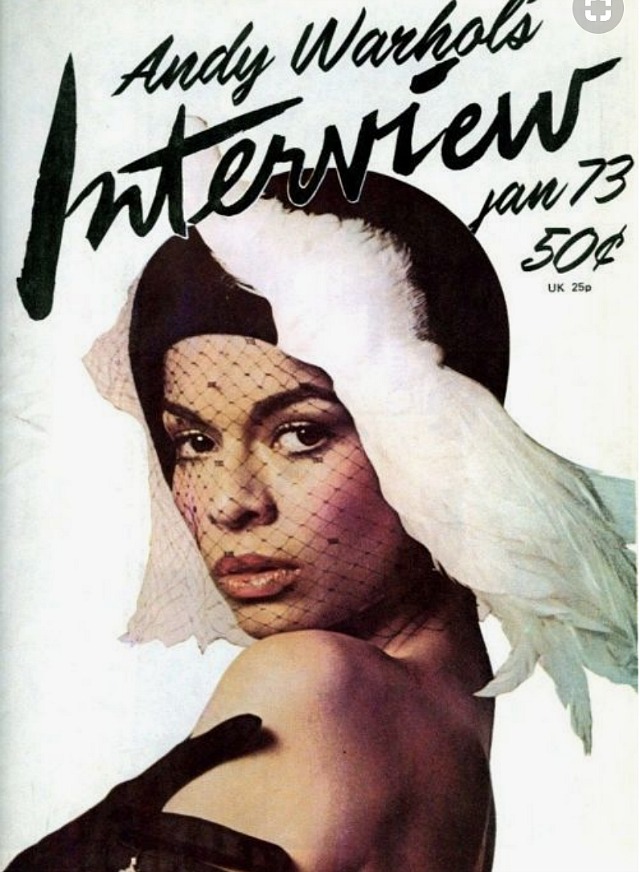
Crystal’s Hot Streak
Billy Crystal is alive and crackling as we speak, obviously, but there’s no denying he had a great run in the early ’90s. A five-year period from ’89 to ’93, specifically. When Harry Met Sally… (’89) kicked things off. The came the near-great. enormously well-liked City Slickers (’91), which opened right smack dab in the middle of Crystal’s four-year-run as the Oscar host (’90 to ’93), which cemented his top-of-the-worldness. (Crystal also Oscar-hosted in ’97, ’98, ’00, ’04 and ’12.)
Things slightly downshifted for Crystal over the next five or six years — City Slickers 2, Mr. Saturday Night, Forget Paris, Hamlet, Deconstructing Harry, Fathers’ Day, My Giant. But he rebounded big-time with Harold Ramis‘s Analyze This (’99). Then he directed ’61, which I re-watched recently and has aged very well. And then he delivered a beautiful eulogy for Muhammud Ali two years ago. And he’s got the book. But the early ’90s!
I’d honestly forgotten that 10-year-old Jake Gyllenhaal played Crystal’s son, Danny, in City Slickers.
While Completely Agreeing…
I still say that anyone who acts in a belligerent, aggressive manner when the cops come is an idiot. Because pushing back against the bulls can only end badly. Beatings, handcuffs, jail cells, sometimes emergency rooms. And sometimes even death. Are the wrong cops on the job? Obviously. Are there a lot more bad ones than authorities realize? Almost certainly. But this isn’t likely to be fixed next week. When the cops arrive, the drama stops. The only way. Head down, calm tone of voice, mild submission…duhhh.
Dead Gotti Twisting In Hell
The last two paragraphs of Glenn Kenny‘s N.Y. Times review of Kevin Connolly‘s Gotti are hilarious.
“For many scenes, it seems that Mr. Connolly asked himself, ‘What would Martin Scorsese do?’ All his answers are wrong. His staging of shots is not even rudimentary. And when he tries for a slightly sophisticated effect, he whiffs. There’s a shallow-focus view of Gotti and his crew walking down the street near their social club. The background is impressionistically out of focus as intended, while the characters walking toward the camera are…well, they’re out of focus, too. Just less out of focus than the background.
“The use of period pop music on the soundtrack here is probably influenced by Mr. Scorsese’s Goodfellas. Except the choices are on-the-nose dull or out-and-out hilarious. The killing of ‘Big Paul’ Castellano, which occurred in December ’85, is accompanied by Elvis Presley’s ‘Silent Night.’ Mr. Connolly even throws in Isaac Hayes’s ‘Theme From Shaft.’ You don’t put the ‘Theme From Shaft’ in a movie that is not Shaft. Come on.”
Side comment: I really don’t like that comma in the sixth sentence of the first paragraph, the one between “focus” and “too.” It may be technically correct but it looks wrong, and that’s the bottom line. HE version: “The background is impressionistically out of focus as intended, while the characters walking toward the camera are…well, they’re out of focus too.”
Sophisticated Innuendo
From Philip Lopate’s N.Y. Review of Books essay on Joseph McBride‘s “How Did Lubitsch Do It?” (Columbia University Press, 561 pp., $40.00): “McBride has set out to write not a biography (no need for that, since Scott Eyman’s ‘Laughter in Paradise’ is so satisfying) but an in-depth ‘essayistic investigation’ of the entire oeuvre. What has been lacking until this critical study has been a sustained, systematic, fully integrated overview of both Lubitsch’s German and American work. Without seeing his career as a single, unified whole, it cannot be fully understood or appreciated.”
Excerpt from “The Masters’ Master: Ernst Lubitsch and The Marriage Circle,” a McBride essay posted on brightlights.com, itself excerpted from “How Did Lubitsch Do It?”: “The name Ernst Lubitsch stood for the epitome of sophisticated humor and romance in what we now regard as the Golden Age of Hollywood. As fellow producer/director Mervyn LeRoy said when presenting him with an honorary Oscar on March 13, 1947, seven months before Lubitsch’s death, ‘He had an adult mind and a hatred of saying things the obvious way. Because of these qualities and a God-given genius, he advanced the technique of screen comedy as no one else has ever done.”
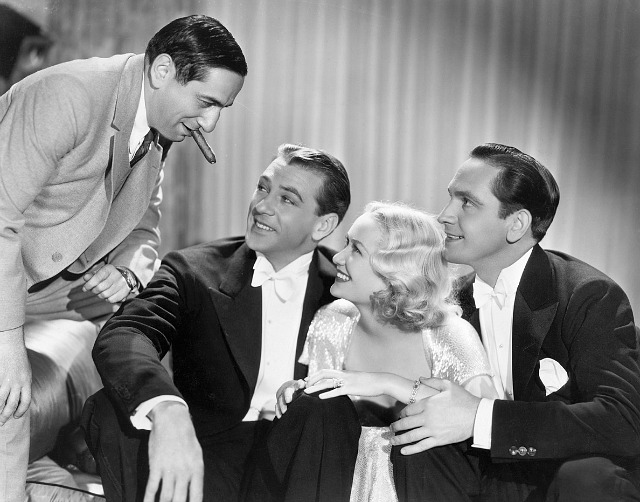
“[The German-born helmer’s] approach to style and theme was widely celebrated as ‘the Lubitsch Touch,’ a virtually indefinable yet almost tangible concept embodying an ever-fresh, delightful, tantalizing, slyly witty blend of style and substance. It combines a characteristic joie de vivre in the actors with an elegant visual design that conveys its meanings largely through sophisticated innuendo.
“But the phrase was something of a marketing cliché, like calling Hitchcock ‘the Master of Suspense,’ and Lubitsch himself was apt to joke about it. When people would ask him what it meant, he would say with a grin, ‘I would like to know myself…you find out and tell me, maybe?’ And he said, ‘I cannot give you a definitive answer because, fortunately, I’m not conscious of it. If I ever become conscious of it — Heaven prevent — I might lose it.’”
Chicago Story
A Criterion Bluray of the ’61 version of A Raisin in the Sun will pop on 9.25.18. Based on Lorraine Hansberry‘s 1959 play, directed by Daniel Petrie, produced by David Susskind. Sidney Poitier, Ruby Dee, Claudia McNeil, Diana Sands, Stephen Perry, John Fiedler and — in his film debut at age 25 — Louis Gossett Jr. Early ’60s social realism — straightforward, modestly framed, well-honed, cards on the table. I’m very sorry, as usual, that Criterion had decided to present this much-honored film in a cleavered 1.85 aspect ratio when they easily could have gone with 1.78 or 1.66. (The cinematography is by Charles Lawton, Jr.) A Columbia Classics DVD presented Raisin in both full-screen and 1.85.


Full-frame.
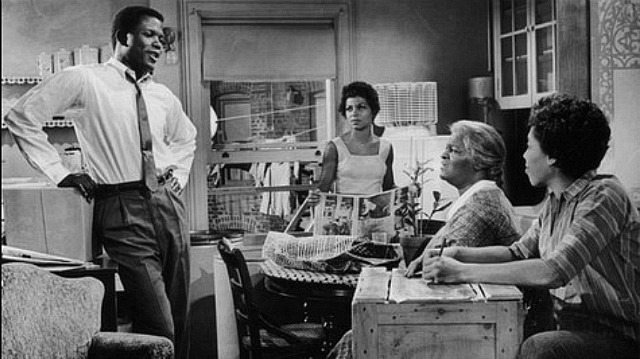
Cleavered.
Thundering SJW Drumbeat
What a wonderful week it’s been. The applicable term is Ongoing Traumatic Stress Disorder. A constant bombardment by SJW mortars and grenades, first from the wolverines and then from a platoon of Outraged Millennials who wanted me dead and disemboweled because I said that Kyle Buchanan‘s description of Brie Larson‘s The Unicorn Store (which I didn’t see during last September’s Toronto Film Festival, and which has no distribution as we speak) sounded “worrisome.”
I actually said it “might” sound worrisome “in some circles,” which obviously allows that other circles might be cool with it. Yup, that’s all it took to inspire a stoning from the zealots. Buchanan’s words: “A charming, colorful, unabashedly girly coming-of-age movie.”
It was the “unabashedly girly” that prompted the “uh-oh.” But it was really the idea of any film unabashedly catering to the sensibilities of any specific group or perspective. I have concerns about any movie that sounds lopsided, excessively focused on a certain mindset or persuasion, or lacking a certain God’s-eye neutrality. I would be just as reluctant to see a film that’s been described as “unabashedly alpha-male” or “unabashedly septugenarian” or “unabashedly red-state.”
Yesterday’s comment from “Downtown Vibe” came to mind: “This is [a result of] having been taught within their groupthink bubbles that anyone with a different opinion is part of an establishment which exists only to be dismantled, and those who challenge their orthodoxy are to be any combination of ignored, dismissed or demonized.”
Roger Thornhill to Phillip Van Damm: “I don’t suppose it would do any good to show you a wallet full of liberal-progressive articles and essays…lamenting the pro-franchise, pro-remake scheme of today’s corporate overlords…singing the praises of anything and everything that’s actually good…being trashed for panning The Birth of a Nation after its first Sundance screening…pleading for David Jones and Harold Pinter‘s Betrayal to be streamed after being a home video no-show of over 30 years…celebrating the glories of Hanoi, Paris, Rome, Prague and Shreveport…singling out the X-factor brilliance of Jonah Hill…tirelessly advocating for the 1.37 version of Shane and persuading Woody Allen to support this…celebrations of the greatest 160 films…praising First Reformed…standing up to Prometheus…worshipping action films that actually adhere to the laws of physics…lamenting Chicago, The King’s Speech, The Artist…championing Alfonso Cuaron‘s Children of Men…worshipping Guillermo Del Toro‘s Pan’s Labyrinth, The Orphanage, Mama, The Devil’s Backbone…worshipping straight-friendly gay films like Brokeback Mountain and Call Me By Your Name.”
Van Damm to Thornhill: “You are a symbol of everything that’s vile and corroded about Hollywood journalism, and sooner or later my legions will pull you off your horse, chop you into pieces and feed your entrails to the dogs.”
Unbearable Trumpness Of Being
From 6.15 N.Y. Times report about Donald Trump’s impromptu North Lawn press conference, titled “Trump, Riding a North Korea High, Unloads on the F.B.I., Democrats and Obama“:
“Mr. Trump was asked on Fox and Friends whether former FBI director James Comey should be prosecuted and put in prison. ‘I would never want to get involved in that,’ Mr. Trump said. ‘Certainly he…they just seem like criminal acts to me. What [Comey] did was criminal. What he did was a terrible thing to the people. What he did was so bad in terms of our Constitution, in terms of the well-being of our country. What [Comey] did was horrible.’
N.Y. Times explanation: “But the inspector general found no evidence that the F.B.I. did anything to stop Mr. Trump or rig the investigation into [Hillary] Clinton in her favor. In fact, the report’s criticisms of Mr. Comey and the bureau’s conduct focused on actions that damaged Mrs. Clinton, not Mr. Trump, and it deemed the decision not to prosecute her a reasonable one.”
Son of Straw Dogs
Posted on 12.26.14: In order to compose a thorough, no-holds-barred saga of his drug-addled past in “Night of the Gun,” a riveting 2009 memoir, N.Y. Times columnist David Carr relied on the accounts of first-hand witnesses, gathered by diligent shoe-leather reporting, rather than his own memory.
I’m mentioning this because a friend reminded me last weekend of an eccentric episode that happened, he said, in my early 20s. When, he also reminded, I was living a colorful, dissolute life. The story made an impression because I didn’t remember all that much. But then certain details began to come back into focus. My friend’s account was probably exaggerated, but I realized that if I ever write a history of my own wild tales I’ll have to get out the pad like Carr.

Here, in any event, is my best recollection:
I was crashing with a married couple, Frank and Karen, in a smallish Boston apartment in the general vicinity of Symphony Hall and Hemenway Street. They had a linebacker-sized friend named Eddie who lived nearby and was also hanging out a lot. Mainly the four of us sat around in the evenings and got high. I distinctly remember not rolling joints as much as tapping the tobacco out of filtered cigarettes and then-filling the cigarette with what I recall was low-grade pot. Moderately potent, lots of stems and seeds.
One night around 10 pm or so we decided we needed a straw for sucking in hash smoke. A tiny chunk of hash placed on the burning embers of a cigarette, etc. No, I don’t remember why we didn’t just use rolled-up dollar bills. Probably because it would’ve been unsanitary.
I recall that it was fairly cold out and that we were probably broke or close to it, and so going to a market and buying a pack of straws was out. So I decided to start knocking on doors and asking Frank and Karen’s neighbors if they had a straw to spare. It wasn’t just the vaguely strange notion of a long-haired guy in jeans and boots with bloodshot eyes looking to bum a straw from strangers, but that it was too late to knock on doors and bum anything from anyone.
Not “No Laugh Funny” — Flatline
One glimpse of Zak Galifianakis and all thoughts of mirth just fly out of my system. It’s not that I’m determined to frown through his material — it’s that he’s never even been close to funny. For me at least. I smirked a bit at his Birdman character…that’s all. Sidenote: Seinfeld’s comment about the “cash grab” of the second and third Hangover film is pretty good.

